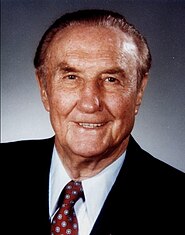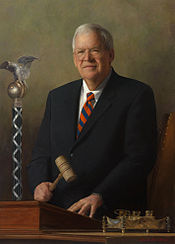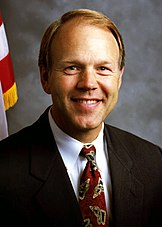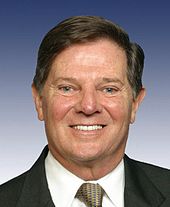106th United States Congress
| 106th United States Congress | |
|---|---|
105th ← → 107th | |
 United States Capitol (2000) | |
January 3, 1999 – January 3, 2001 | |
| Members | 100 senators 435 representatives 5 non-voting delegates |
| Senate majority | Republican |
| Senate President | Al Gore (D) |
| House majority | Republican |
| House Speaker | Dennis Hastert (R) |
| Sessions | |
| 1st: January 6, 1999 – November 22, 1999 2nd: January 24, 2000 – December 15, 2000 | |
The 106th United States Congress was a meeting of the legislative branch of the United States federal government, composed of the United States Senate and the United States House of Representatives. It met in Washington, D.C., from January 3, 1999, to January 3, 2001, during the last two years of Bill Clinton's presidency. The apportionment of seats in the House of Representatives was based on the 1990 United States census. Both chambers maintained a Republican majority.
This is the most recent Congress with Republican senators from the states of Delaware (William Roth), Michigan (Spencer Abraham) and Washington (Slade Gorton), all of whom lost re-election in 2000.
Major events
[edit]- January 7, 1999 – February 12, 1999: Impeachment trial of Bill Clinton
- March 24, 1999 – June 10, 1999: NATO bombing of Yugoslavia
- March 29, 1999: Dow Jones Industrial Average ended above 10,000 for the first time.
- April 20, 1999: Columbine High School massacre
- April 3, 2000: United States v. Microsoft: Federal court held Microsoft liable for anti-trust violations
- November 7, 2000: Presidential election, Senate election, House election
- November 7, 2000 – December 13, 2000: Presidential election, Florida recount, and Bush v. Gore litigation
Major legislation
[edit]- May 21, 1999: Emergency Supplemental Appropriations Act, Pub. L. 106–31 (text) (PDF) (Kosovo operations)
- August 17, 1999: Water Resources Development Act of 1999, Pub. L. 106–53 (text) (PDF)
- October 26, 1999: Wireless Communications and Public Safety Act of 1999, Pub.L. 106-81
- November 12, 1999: Gramm-Leach-Bliley Financial Services Modernization Act, Pub. L. 106–102 (text) (PDF)
- November 29, 1999: American Inventors Protection Act, Pub. L. 106–113 (text) (PDF) (including Anticybersquatting Consumer Protection Act)
- December 9, 1999: Digital Theft Deterrence and Copyright Damages Improvement Act of 1999, Pub.L. 106-160
- December 14, 1999: Foster Care Independence Act, Pub. L. 106–169 (text) (PDF)
- March 14, 2000: Iran Nonproliferation Act of 2000, Pub. L. 106–178 (text) (PDF)
- April 5, 2000: Wendell H. Ford Aviation Investment and Reform Act for the 21st Century, Pub. L. 106–181 (text) (PDF)
- May 18, 2000: African Growth and Opportunity Act, Pub. L. 106–200 (text) (PDF)
- May 26, 2000: Hmong Veterans' Naturalization Act of 2000, Pub.L. 106-207
- May 26, 2000: Muhammad Ali Boxing Reform Act, Pub.L. 106-210
- June 22, 2000: Agricultural Risk Protection Act of 2000, Pub.L. 106-224
- June 30, 2000: Electronic Signatures in Global and National Commerce Act, Pub. L. 106–229 (text) (PDF)
- August 7, 2000: Oceans Act, Pub. L. 106–256 (text) (PDF)
- August 19, 2000: Global AIDS and Tuberculosis Relief Act of 2000, Pub.L. 106-264
- September 22, 2000: Religious Land Use and Institutionalized Persons Act, Pub. L. 106–274 (text) (PDF)
- October 10, 2000: U.S.-China Relations Act of 2000, Pub.L. 106-286
- October 17, 2000: Children's Health Act, Pub. L. 106–310 (text) (PDF)
- October 28, 2000: Victims of Trafficking and Violence Protection Act of 2000, Pub. L. 106–386 (text) (PDF)
- October 30, 2000: Robert T. Stafford Disaster Relief and Emergency Assistance Act, Pub. L. 106–390 (text) (PDF)
- October 30, 2000: Secure Rural Schools and Community Self-Determination Act of 2000, Pub.L. 106-393
- October 30, 2000: Child Citizenship Act of 2000, Pub. L. 106–395 (text) (PDF)
- November 1, 2000: Transportation Recall Enhancement, Accountability, and Documentation (TREAD) Act, Pub.L. 106-414
- November 22, 2000: Military Extraterritorial Jurisdiction Act of 2000, Pub.L. 106-523
- December 11, 2000: Water Resources Development Act of 2000, Pub. L. 106–541 (text) (PDF)
- December 19, 2000: DNA Analysis Backlog Elimination Act of 2000, Pub.L. 106-546
- December 21, 2000: Legal Immigration Family Equity Act, Pub. L. 106–553 (text) (PDF)
- December 21, 2000: Commodity Futures Modernization Act of 2000, Pub. L. 106–554 (text) (PDF) (as part of the Consolidated Appropriations Act, 2001)
- December 21, 2000: Shark Finning Prohibition Act, Pub.L. 106-557
Treaties considered
[edit]- October 13, 1999: Comprehensive Nuclear Test Ban Treaty: Rejected[1]
Party summary
[edit]Senate
[edit]
Membership changed with two deaths.
| Affiliation | Party (Shading indicates majority caucus)
|
Total | ||
|---|---|---|---|---|
| Democratic | Republican | Vacant | ||
| End of previous Congress | 45 | 55 | 100 | 0 |
| Begin | 45 | 55 | 100 | 0 |
| October 24, 1999[a] | 54 | 99 | 1 | |
| November 2, 1999[a] | 55 | 100 | 0 | |
| July 18, 2000[b] | 54 | 99 | 1 | |
| July 25, 2000[b] | 46 | 100 | 0 | |
| Final voting share | 46% | 54% | ||
| Beginning of the next Congress | 50 | 50 | 100 | 0 |
House of Representatives
[edit]There were two resignations and three deaths.
| Affiliation | Party (Shading indicates majority caucus)
|
Total | |||
|---|---|---|---|---|---|
| Democratic | Independent | Republican | Vacant | ||
| End of previous Congress | 206 | 1 | 228 | 435 | 0 |
| Begin | 211 | 1 | 223 | 435 | 0 |
| March 2, 1999 | 222 | 434 | 1 | ||
| June 7, 1999 | 223 | 435 | 0 | ||
| July 16, 1999 | 210 | 434 | 1 | ||
| July 17, 1999 | 211 | 222 | 434 | 1 | |
| November 17, 1999 | 212 | 435 | 0 | ||
| January 27, 2000 | 2 | 221 | 435 | 0 | |
| July 27, 2000 | 210 | 435 | 0 | ||
| September 11, 2000 | 209 | 434 | 1 | ||
| October 10, 2000 | 208 | 434 | 2 | ||
| December 8, 2000 | 222 | 433 | 3 | ||
| End | 433 | 3 | |||
| Final voting share | 48.5% | 0.3% | 51.2% | ||
| Beginning of the next Congress | 211 | 2 | 221 | 434 | 1 |
Leadership
[edit]Senate
[edit]- President: Al Gore (D)
- President pro tempore: Strom Thurmond (R)
Majority (Republican) leadership
[edit]- Majority Leader: Trent Lott
- Majority Whip: Don Nickles
- Republican Conference Chairman: Connie Mack III
- Republican Conference Secretary: Paul Coverdell
- Republican Campaign Committee Chairman: Mitch McConnell
- Policy Committee Chairman: Larry Craig
Minority (Democratic) leadership
[edit]- Minority Leader: Tom Daschle
- Minority Whip: Harry Reid
- Policy Committee Chairman: Byron Dorgan
- Democratic Conference Secretary: Barbara Mikulski
- Democratic Campaign Committee Chairman: Robert Torricelli
- Chief Deputy Whip: John Breaux
House of Representatives
[edit]- Speaker: Dennis Hastert (R)
Majority (Republican) leadership
[edit]- Majority Leader: Dick Armey
- Majority Whip: Tom DeLay
- Chief Deputy Whip: Roy Blunt
- Republican Conference Chairman: J. C. Watts
- Republican Conference Vice-Chairman: Tillie Fowler
- Republican Conference Secretary: Deborah Pryce
- Policy Committee Chairman: Christopher Cox
- Republican Campaign Committee Chairman: Tom Davis
- House Rules Committee Chairman: David Dreier
Minority (Democratic) leadership
[edit]- Minority Leader: Dick Gephardt
- Minority Whip: David Bonior
- Chief Deputy Minority Whips: Chet Edwards, John Lewis, Ed Pastor & Maxine Waters
- Democratic Caucus Chairman: Martin Frost
- Democratic Caucus Vice Chairman: Bob Menendez
- Democratic Campaign Committee Chairman: Patrick J. Kennedy
Members
[edit]Senate
[edit]In this Congress, Class 1 meant their term ended with this Congress, facing re-election in 2000; Class 2 meant their term began in the last Congress, facing re-election in 2002; and Class 3 meant their term began in this Congress, facing re-election in 2004.
House of Representatives
[edit]|
Alabama — Alaska — Arizona — Arkansas — California — Colorado — Connecticut — Delaware — Florida — Georgia — Hawaii — Idaho — Illinois — Indiana — Iowa — Kansas — Kentucky — Louisiana — Maine — Maryland — Massachusetts — Michigan — Minnesota — Mississippi — Missouri — Montana — Nebraska — Nevada — New Hampshire — New Jersey — New Mexico — New York — North Carolina — North Dakota — Ohio — Oklahoma — Oregon — Pennsylvania — Rhode Island — South Carolina — South Dakota — Tennessee — Texas — Utah — Vermont — Virginia — Washington — West Virginia — Wisconsin — Wyoming — Non-voting members |
Changes in membership
[edit]Senate
[edit]| State (class) |
Vacated by | Reason for change | Successor | Date of successor's formal installation[c] |
|---|---|---|---|---|
| Rhode Island (1) |
John Chafee (R) | Died October 24, 1999. Successor appointed on November 2, 1999, and later elected for a full six-year term. |
Lincoln Chafee (R) | November 2, 1999 |
| Georgia (3) |
Paul Coverdell (R) | Died July 18, 2000. Successor appointed on July 24, 2000, and later elected to finish the term ending January 3, 2005. |
Zell Miller (D) | July 24, 2000 |
House of Representatives
[edit]| District | Vacated by | Reason for change | Successor | Date of successor's formal installation[c] |
|---|---|---|---|---|
| Georgia 6th | Vacant | Newt Gingrich (R) resigned January 3, 1999. Successor elected February 23, 1999. |
Johnny Isakson (R) | February 23, 1999 |
| Louisiana 1st | Bob Livingston (R) | Resigned March 1, 1999. Successor elected May 29, 1999. |
David Vitter (R) | May 29, 1999 |
| California 42nd | George Brown Jr. (D) | Died July 15, 1999. Successor elected November 16, 1999. |
Joe Baca (D) | November 16, 1999 |
| New York 1st | Michael Forbes (R) | Changed political affiliation July 17, 1999. | Michael Forbes (D) | July 17, 1999 |
| Virginia 5th | Virgil Goode (D) | Changed party affiliation January 27, 2000. | Virgil Goode (I) | January 27, 2000 |
| California 31st | Matthew G. Martínez (D) | Changed party affiliation July 27, 2000. | Matthew G. Martínez (R) | July 27, 2000 |
| Virginia 1st | Herbert H. Bateman (R) | Died September 11, 2000. | Seat vacant until next Congress | |
| Minnesota 4th | Bruce Vento (D) | Died October 10, 2000. | ||
| California 32nd | Julian Dixon (D) | Died December 8, 2000. | ||
Committees
[edit]For members (House and Senate) of the committees and their assignments, go into the Official Congressional Directory at the bottom of the article and click on the link (1 link), in the directory after the pages of terms of service, you will see the committees of the Senate, House (Standing with Subcommittees, Select and Special) and Joint and after the committee pages, you will see the House/Senate committee assignments in the directory, on the committees section of the House and Senate in the Official Congressional Directory, the committee's members on the first row on the left side shows the chairman of the committee and on the right side shows the ranking member of the committee.
Senate
[edit]- Aging (Special) (Chair: Chuck Grassley, Ranking Member: John Breaux)
- Agriculture, Nutrition and Forestry (Chair: Richard Lugar, Ranking Member: Tom Harkin)
- Appropriations (Chair: Ted Stevens, Ranking Member: Robert Byrd)
- Agriculture, Rural Development and Related Agencies (Chair: Thad Cochran)
- Commerce, Justice, State and the Judiciary (Chair: Judd Gregg)
- Defense (Chair: Ted Stevens)
- District of Columbia (Chair: Kay Bailey Hutchison)
- Energy and Water Development (Chair: Pete Domenici)
- Foreign Operations (Chair: Mitch McConnell)
- Interior (Chair: Slade Gorton)
- Labor, Health, Human Services and Education (Chair: Arlen Specter)
- Legislative Branch (Chair: Robert F. Bennett)
- Military Construction (Chair: Conrad Burns)
- Transportation (Chair: Richard Shelby)
- Treasury and General Government (Chair: Ben Nighthorse Campbell)
- VA, HUD and Independent Agencies (Chair: Kit Bond)
- Armed Services (Chair: John Warner, Ranking Member: Carl Levin)
- Airland (Chair: Rick Santorum)
- Emerging Threats and Capabilities (Chair: Pat Roberts)
- Personnel (Chair: Wayne Allard)
- Readiness and Management Support (Chair: Jim Inhofe)
- Seapower (Chair: Olympia Snowe)
- Strategic (Chair: Bob Smith)
- Banking, Housing and Urban Affairs (Chair: Phil Gramm, Ranking Member: Paul Sarbanes)
- Economic Policy (Chair: Connie Mack III)
- Financial Institutions (Chair: Robert F. Bennett, Vice Chair: Chuck Hagel)
- Housing and Transportation (Chair: Wayne Allard, Vice Chair: Rick Santorum)
- International Trade and Finance (Chair: Mike Enzi, Vice Chair: Mike Crapo)
- Securities (Chair: Rod Grams, Vice Chair: Jim Bunning)
- Budget (Chair: Pete Domenici, Ranking Member: Frank Lautenberg)
- Commerce, Science and Transportation (Chair: John McCain, Ranking Member: Fritz Hollings)
- Aviation (Chair: Slade Gorton)
- Communications (Chair: Conrad Burns)
- Consumer Affairs, Foreign Commerce and Tourism (Chair: John Ashcroft)
- Manufacturing and Competitiveness (Chair: Spencer Abraham)
- Oceans and Fisheries (Chair: Olympia Snowe)
- Surface Transportation and Merchant Marine (Chair: Bill Frist)
- Energy and Natural Resources (Chair: Frank Murkowski, Ranking Member: Jeff Bingaman)
- Energy Research, Development, Production and Regulation (Chair: Don Nickles, Vice Chair: Pete Domenici)
- Forests and Public Land Management (Chair: Larry Craig, Vice Chair: Conrad Burns)
- National Parks, Historic Preservation and Recreation (Chair: Craig L. Thomas, Vice Chair: Ben Nighthorse Campbell)
- Water and Power (Chair: Gordon H. Smith, Vice Chair: Slade Gorton)
- Environment and Public Works (Chair: Bob Smith, Ranking Member: Max Baucus)
- Ethics (Select) (Chair: Pat Roberts, Ranking Member: Harry Reid)
- Finance (Chair: William V. Roth Jr., Ranking Member: Daniel Patrick Moynihan)
- Health Care (Chair: John Chafee)
- International Trade (Chair: Chuck Grassley)
- Long-Term Growth and Debt Reduction (Chair: Frank Murkowski)
- Social Security and Family Policy (Chair: Don Nickles)
- Taxation and IRS Oversight (Chair: Orrin Hatch)
- Foreign Relations (Chair: Jesse Helms, Ranking Member: Joe Biden)
- African Affairs (Chair: Bill Frist)
- East Asian and Pacific Affairs (Chair: Craig L. Thomas)
- European Affairs (Chair: Gordon H. Smith)
- International Economic Policy, Export and Trade Promotion (Chair: Chuck Hagel)
- International Operations (Chair: Rod Grams)
- Near Eastern and South Asian Affairs (Chair: Sam Brownback)
- Western Hemisphere, Peace Corps, Narcotics and Terrorism (Chair: Paul Coverdell)
- Governmental Affairs (Chair: Fred Thompson, Ranking Member: Joe Lieberman)
- Indian Affairs (Select) (Chair: Ben Nighthorse Campbell, Ranking Member: Daniel Inouye)
- Intelligence (Select) (Chair: Richard Shelby, Ranking Member: Richard Bryan)
- Health, Education, Labor and Pensions (Chair: Jim Jeffords, Ranking Member: Ted Kennedy)
- Children and Families (Chair: Judd Gregg)
- Public Health (Chair: Bill Frist)
- Aging (Chair: Mike DeWine)
- Employment, Safety and Training (Chair: Mike Enzi)
- Judiciary (Chair: Orrin Hatch, Ranking Member: Patrick Leahy)
- Administrative Oversight and the Courts (Chair: Chuck Grassley)
- Antitrust, Business Rights and Competition (Chair: Mike DeWine)
- Constitution, Federalism and Property Rights (Chair: John Ashcroft)
- Criminal Justice Oversight (Chair: Strom Thurmond)
- Immigration (Chair: Spencer Abraham)
- Technology, Terrorism and Government Information (Chair: Jon Kyl)
- Youth Violence (Chair: Jeff Sessions)
- Rules and Administration (Chair: Mitch McConnell, Ranking Member: Chris Dodd)
- Small Business (Chair: Kit Bond, Ranking Member: John Kerry)
- Veterans' Affairs (Chair: Arlen Specter, Ranking Member: Jay Rockefeller)
House of Representatives
[edit]- Agriculture (Chair: Larry Combest, Vice Chair: Bill Barrett, Ranking Member: Charles Stenholm)
- Department Operations, Oversight, Nutrition and Forestry (Chair: Bob Goodlatte, Vice Chair: Thomas W. Ewing)
- General Farm Commodities, Resource Conservation and Credit (Chair: Bill Barrett, Vice Chair: John A. Boehner)
- Livestock and Horticulture (Chair: Richard Pombo, Vice Chair: John A. Boehner)
- Risk Management, Research and Specialty Crops (Chair: Thomas W. Ewing, Vice Chair: Bill Barrett)
- Appropriations (Chair: Bill Young, Ranking Member: Dave Obey)
- Agriculture, Rural Development, Food and Drug Administration and Related Agencies (Chair: Joe Skeen)
- Commerce, Justice, State and Judiciary (Chair: Hal Rogers)
- Defense (Chair: Jerry Lewis)
- District of Columbia (Chair: Ernest J. Istook)
- Energy and Water Development (Chair: Ron Packard)
- Foreign Operations, Export Financing and Related Programs (Chair: Sonny Callahan)
- Interior (Chair: Ralph Regula)
- Labor, Health, Human Services and Education (Chair: John Edward Porter)
- Legislative (Chair: Charles H. Taylor)
- Military Construction (Chair: David L. Hobson)
- Transportation (Chair: Frank Wolf)
- Treasury, Postal Service and General Government (Chair: Jim Kolbe)
- VA-HUD Independent Agencies (Chair: James T. Walsh)
- Armed Services (Chair: Floyd Spence, Vice Chair: Bob Stump, Ranking Member: Ike Skelton)
- Military Installations and Facilities (Chair: Joel Hefley)
- Military Personnel (Chair: Steve Buyer)
- Military Procurement (Chair: Duncan L. Hunter)
- Military Readiness (Chair: Herbert Bateman, Vice Chair: Walter B. Jones Jr.)
- Military Research and Development (Chair: Curt Weldon)
- Special Oversight Panel on Morale, Welfare and Recreation (Chair: John M. McHugh, Vice Chair: Bob Riley)
- Special Oversight Panel on the Merchant Marine (Chair: Herbert Bateman)
- Banking and Financial Services (Chair: Jim Leach, Vice Chair: Steven T. Kuykendall, Ranking Member: John LaFalce)
- Capital Markets, Securities and Government Sponsored Enterprises (Chair: Richard Baker, Vice Chair: Frank D. Lucas)
- Domestic and International Monetary Policy (Chair: Spencer Bachus, Vice Chair: Ron Paul)
- Financial Institutions and Consumer Credit (Chair: Marge Roukema, Vice Chair: Bill McCollum)
- General Oversight and Investigations (Chair: Peter T. King, Vice Chair: Steven C. LaTourette)
- Housing and Community Opportunity (Chair: Rick Lazio, Vice Chair: Robert W. Ney)
- Budget (Chair: John Kasich, Ranking Member: John Spratt)
- Commerce (Chair: Thomas J. Bliley Jr., Vice Chair: Paul E. Gillmor, Ranking Member: John Dingell)
- Energy and Power (Chair: Joe Barton, Vice Chair: Cliff Stearns)
- Finance and Hazardous Materials (Chair: Mike Oxley, Vice Chair: Billy Tauzin)
- Health and the Environment (Chair: Michael Bilirakis, Vice Chair: Tom Coburn)
- Oversight and Investigations (Chair: Fred Upton, Vice Chair: Richard Burr)
- Telecommunications, Trade and Consumer Protection (Chair: Billy Tauzin, Vice Chair: Mike Oxley)
- Education and the Workforce (Chair: William F. Goodling, Vice Chair: William F. Goodling, Ranking Member: Bill Clay)
- Employer-Employee Relations (Chair: John A. Boehner, Vice Chair: Ernie Fletcher)
- Workforce Protections (Chair: Cass Ballenger, Vice Chair: Bill Barrett)
- Oversight and Investigations (Chair: Peter Hoekstra. Vice Chair: Charles W. Norwood Jr.)
- Postsecondary Education, Training and Life-Long Learning (Chair: Buck McKeon, Vice Chair: Lindsey O. Graham)
- Early Childhood, Youth and Families (Chair: Michael Castle, Vice Chair: Bob Schaffer)
- Government Reform (Chair: Dan Burton, Vice Chair: Steve LaTourette, Ranking Member: Henry Waxman)
- Census (Chair: Dan Miller, Vice Chair: John T. Doolittle)
- Civil Service (Chair: Joe Scarborough, Vice Chair: Asa Hutchinson)
- Criminal Justice, Drug Policy and Human Resources (Chair: John Mica, Vice Chair: Bob Barr)
- District of Columbia (Chair: Richard Baker, Vice Chair: Connie Morella)
- Government Management, Information and Technology (Chair: Stephen Horn, Vice Chair: Judy Biggert)
- National Economic Growth, Natural Resources and Regulatory Affairs (Chair: David M. McIntosh, Vice Chair: Paul Ryan)
- National Security, Veterans' Affairs and International Relations (Chair: Christopher Shays, Vice Chair: Mark E. Souder)
- Postal Service (Chair: John M. McHugh, Vice Chair: Mark Souder)
- House Administration (Chair: Bill Thomas, Ranking Member: Steny Hoyer)
- International Relations (Chair: Benjamin A. Gilman, Ranking Member: Sam Gejdenson)
- Africa (Chair: Edward Royce)
- Asia and the Pacific (Chair: Doug Bereuter)
- International Operations and Human Rights (Chair: Chris Smith)
- Western Hemisphere (Chair: Elton Gallegly)
- International Economic Policy and Trade (Chair: Ileana Ros-Lehtinen)
- Judiciary (Chair: Henry J. Hyde, Ranking Member: John Conyers)
- Commercial and Administrative Law (Chair: George Gekas)
- The Constitution (Chair: Charles T. Canady)
- Courts and Intellectual Property (Chair: Howard Coble)
- Crime (Chair: Bill McCollum)
- Immigration and Claims (Chair: Lamar Smith)
- Resources (Chair: Don Young, Ranking Member: George Miller)
- Energy and Mineral Resources (Chair: Barbara Cubin)
- Fisheries Conservation, Wildlife and Oceans (Chair: Jim Saxton)
- National Parks and Public Lands (Chair: James V. Hansen)
- Forests and Forest Health (Chair: Helen Chenoweth)
- Water and Power (Chair: John T. Doolittle)
- Rules (Chair: David Dreier, Vice Chair: Porter Goss, Ranking Member: Joe Moakley)
- The Legislative Process (Chair: Porter Goss, Vice Chair: Deborah Pryce)
- The Rules and Organizations of the House (Chair: John Linder, Vice Chair: Lincoln Diaz-Balart)
- Science (Chair: Jim Sensenbrenner, Vice Chair: Vern Ehlers, Ranking Member: George Brown Jr., then Ralph Hall)
- Basic Research (Chair: Nick Smith, Vice Chair: Judy Biggert)
- Energy and the Environment (Chair: Ken Calvert, Vice Chair: Gary G. Miller)
- Space and Aeronautics (Chair: Dana Rohrabacher, Vice Chair: Dave Weldon)
- Technology (Chair: Constance Morella, Vice Chair: Gil Gutknecht)
- Small Business (Chair: Jim Talent, Ranking Member: Nydia Velázquez)
- Empowerment (Chair: Joseph R. Pitts, Vice Chair: Jim DeMint)
- Government Programs and Oversight (Chair: Roscoe G. Bartlett, Vice Chair: Mary Bono)
- Regulatory Reform and Paperwork Reduction (Chair: Sue Kelly, Vice Chair: John Thune)
- Tax, Finance and Exports (Chair: Donald A. Manzullo, Vice Chair: Steve Chabot)
- Rural Enterprises, Business Opportunities and Special Small Business Problems (Chair: Frank LoBiondo, Vice Chair: Rick Hill)
- Standards of Official Conduct (Chair: Lamar S. Smith, Ranking Member: Howard Berman)
- Transportation and Infrastructure (Chair: Bud Shuster, Vice Chair: Tom Petri, Ranking Member: Jim Oberstar)
- Aviation (Chair: John J. Duncan Jr., Vice Chair: John E. Sweeney)
- Coast Guard and Maritime Transportation (Chair: Wayne T. Gilchrest, Vice Chair: Frank A. LoBiondo)
- Economic Development, Public Buildings, Hazardous Materials and Pipeline Transportation (Chair: Bob Franks, Vice Chair: John Cooksey)
- Ground Transportation (Chair: Tom Petri, Vice Chair: Bob Franks)
- Oversight, Investigations and Emergency Management (Chair: Tillie K. Fowler, Vice Chair: Lee Terry)
- Water Resources and Environment (Chair: Sherwood L. Boehlert, Vice Chair: Don Sherwood)
- Veterans' Affairs (Chair: Bob Stump, Vice Chair: Chris Smith, Ranking Member: Lane Evans)
- Health (Chair: Cliff Stearns, Vice Chair: Michael Bilirakis)
- Benefits (Chair: Jack Quinn, Vice Chair: J.D. Hayworth)
- Oversight and Investigations (Chair: Terry Everett)
- Ways and Means (Chair: William Reynolds Archer Jr., Ranking Member: Charles Rangel)
- Health (Chair: Bill Thomas)
- Human Resources (Chair: Nancy Johnson)
- Oversight (Chair: Amo Houghton)
- Social Security (Chair: Clay Shaw)
- Trade (Chair: Phil Crane)
- Whole
Joint committees
[edit]- Economic (Chair: Sen. Connie Mack III, Vice Chair: Rep. Jim Saxton)
- Taxation (Chair: Rep. Bill Archer, Vice Chair: Sen. William V. Roth)
- The Library (Chair: Sen. Ted Stevens, Vice Chair: Rep. Bill Thomas)
- Printing (Chair: Bill Thomas, Vice Chair: Rep. Mitch McConnell)
Caucuses
[edit]Employees
[edit]Legislative branch agency directors
[edit]- Architect of the Capitol: Alan M. Hantman
- Attending Physician of the United States Congress: John F. Eisold
- Comptroller General of the United States: David M. Walker
- Director of the Congressional Budget Office: June E. O'Neill, until January 29, 1999
- James Blum, January 29, 1999 - February 3, 1999
- Dan Crippen, from February 3, 1999
- Librarian of Congress: James H. Billington
- Public Printer of the United States: Michael F. DiMario
Senate
[edit]- Chaplain: Lloyd John Ogilvie (Presbyterian)
- Curator: Diane K. Skvarla
- Historian: Richard A. Baker
- Parliamentarian: Bob Dove
- Secretary: Gary Lee Sisco
- Librarian: Greg Harness
- Secretary for the Majority: Elizabeth B. Letchworth
- Secretary for the Minority: Martin P. Paone
- Sergeant at Arms: James W. Ziglar
House of Representatives
[edit]- Chaplain: James David Ford (Lutheran), until March 23, 2000
- Daniel P. Coughlin (Roman Catholic), from March 23, 2000
- Chief Administrative Officer: James M. Eagen III
- Clerk: Jeff Trandahl
- Reading Clerks:
- Mary Kevin Niland (D)
- Bob Berry (until 1999) along with Paul Hays (R)
- Inspector General: John W. Lainhart IV then Steven McNamara
- Parliamentarian: Charles W. Johnson
- Sergeant at Arms: Wilson Livingood
Exoneration of Charles Butler McVay III
[edit]In October 2000, the United States Congress passed a Sense of Congress resolution that McVay's record should reflect that "he is exonerated for the loss of the USS Indianapolis." President Clinton also signed the resolution. which rightented the miscarriage of justice on Charles B. McVay III for the sinking of the USS Indianapolis in 30 July 1945 by Japanese submarine I-58 (1943)
See also
[edit]- List of new members of the 106th Congress
- 1998 United States elections (elections leading to this Congress)
- 2000 United States elections (elections during this Congress, leading to the next Congress)
Notes
[edit]- ^ a b In Rhode Island, John Chafee (R) died October 24, 1999, and his son, Lincoln Chafee (R), was appointed November 2, 1999, to finish the term.
- ^ a b In Georgia, Paul Coverdell (R) died July 18, 2000, and Zell Miller (D) was appointed July 25, to continue the term.
- ^ a b When seated or oath administered, not necessarily when service began.
References
[edit]- ^ Comprehensive Nuclear Test Ban Treaty, via THOMAS
External links
[edit]- Biographical Directory of the United States Congress
- History, Art and Archives from the U.S. House of Representatives
- Statistics & Lists from the U.S. Senate
- Legislative information Archived August 30, 2015, at the Wayback Machine from THOMAS at the Library of Congress
- "Videos of House of Representatives Sessions for the 106th Congress from www.C-SPAN.org".
- "Videos of Senate Sessions for the 106th Congress from www.C-SPAN.org".
- "Videos of Committees from the House and Senate for the 106th Congress from www.C-SPAN.org".
- House of Representatives Session Calendar for the 106th Congress (PDF).
- Senate Session Calendar for the 106th Congress (PDF).
- Congressional Pictorial Directory for the 106th Congress.
- Official Congressional Directory for the 106th Congress.
- Official Congressional Directory for the 106th Congress (1st Revision) (PDF).
- Official Congressional Directory for the 106th Congress (2nd Revision) (PDF).













